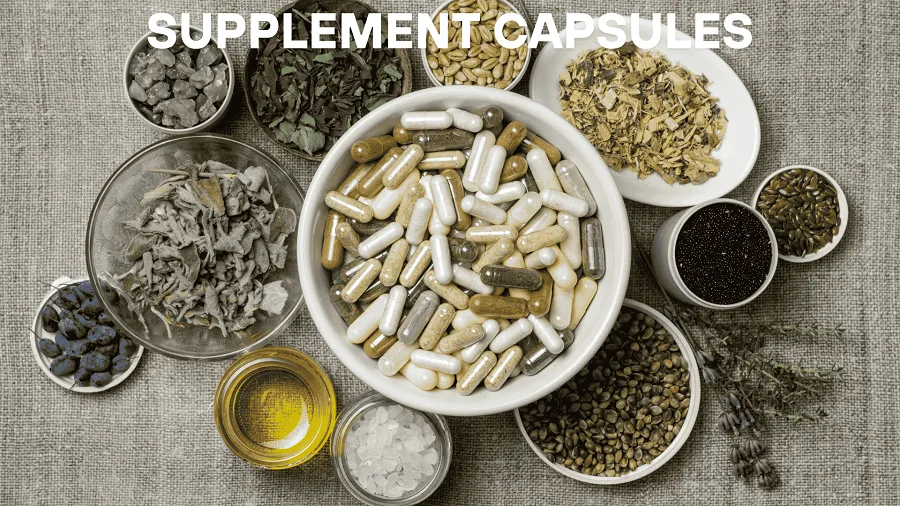Introduction
Supplement capsules are a cornerstone of the health and wellness industry, offering a convenient way to boost nutrition, support specific health goals, or address dietary deficiencies. From vitamins to herbal extracts, these small, swallowable capsules pack a punch, but they also spark curiosity and concern. What are they made of? Are they safe? How do they compare to other forms like liquids or gummies? This article dives into these questions, providing a comprehensive guide to supplement capsules, their contents, safety, and practical use. Whether you’re a supplement novice or a seasoned user, this guide will help you make informed choices.
What Are Supplement Capsules?
Supplement capsules are hard-shelled, dissolvable containers filled with dietary supplements, designed for oral consumption. The shell, typically made of gelatin (derived from animal collagen) or vegetarian cellulose (plant-based), protects the contents and dissolves in the stomach to release the active ingredients. Capsules are popular due to their portability, precise dosing, and ability to mask the taste of certain supplements.
A common misconception is that capsules are made of plastic. In reality, they are crafted from safe, biodegradable materials like gelatin or hydroxypropyl methylcellulose (HPMC), a plant-derived compound used in vegetarian capsules. Gelatin capsules suit most users but may not be ideal for vegetarians or those with religious dietary restrictions. Vegetarian capsules, while slightly more expensive, cater to these needs and dissolve similarly in the digestive system.

| Capsule Type | Material | Source | Suitability |
|---|---|---|---|
| Gelatin | Collagen | Animal (bovine/porcine) | General use, not for vegetarians/vegans |
| Vegetarian | Cellulose (HPMC) | Plant-based | Vegetarians, vegans, religious diets |
Common Contents of Supplement Capsules
Supplement capsules can contain a wide range of active ingredients, tailored to various health needs. Below are the most common categories and examples:
| Category | Examples | Purpose |
|---|---|---|
| Vitamins | Vitamin C, Vitamin D, B-complex | Immune support, bone health, energy production |
| Minerals | Calcium, Magnesium, Zinc | Bone strength, muscle function, immune health |
| Herbal Extracts | Turmeric, Ashwagandha, Ginseng | Anti-inflammatory, stress relief, energy boost |
| Amino Acids/Proteins | Collagen, L-theanine | Skin and joint health, relaxation |
| Other Compounds | Probiotics, Omega-3s, Coenzyme Q10 | Gut health, heart health, cellular energy |
The contents vary in dosage and form (e.g., powdered extracts or concentrated oils), and some capsules combine multiple ingredients for synergistic effects. For example, a joint health capsule might include collagen, glucosamine, and turmeric. Always check labels for purity, potency, and potential allergens, as formulations differ by brand.
Comparing Supplement Capsules to Other Forms
Supplement capsules are one of many delivery methods for dietary supplements. Below, we compare them to liquids, gummies, softgels, and powders to help you choose the best option.
| Form | Pros | Cons | Best For |
|---|---|---|---|
| Capsules | Precise dosing, portable, long shelf life, masks taste | May be hard to swallow for some, slower absorption | Those seeking convenience and versatility |
| Liquids | Faster absorption, adjustable dosing | Requires measuring, shorter shelf life, may taste unpleasant | Those prioritizing quick absorption |
| Gummies | Tasty, easy to chew, appealing to kids | Added sugars, lower potency, limited ingredient range | Those who dislike swallowing pills |
| Softgels | Ideal for oil-based supplements, fast dissolution | Limited to liquid/oil contents, not vegetarian-friendly | Oil-based supplements like fish oil |
| Powders | Flexible dosing, mixable with food/drinks | Messy, requires preparation, may taste bad | Those wanting customizable doses |
Capsules vs. Liquid Supplements
Liquids may absorb faster because they bypass the capsule dissolution step, but studies suggest the difference is minimal for most nutrients (e.g., vitamin C absorption rates are similar in both forms). Liquids require measuring, which can lead to dosing errors, and they often have a shorter shelf life. Capsules, however, are pre-dosed, portable, and stable, making them ideal for travel or busy lifestyles.
Capsules vs. Gummies
Gummies are popular for their taste and chewable nature, especially for children or those who dislike pills. However, they often contain added sugars or artificial sweeteners, and their size limits nutrient potency. For example, a vitamin D gummy might provide 400 IU, while a capsule can deliver 5,000 IU. Capsules are better for higher-potency needs and sugar-conscious diets.

Capsules vs. Softgels
Softgels, made of gelatin, encase liquid or oil-based supplements (e.g., fish oil, vitamin E). They dissolve faster than hard capsules and are ideal for fat-soluble nutrients. However, they’re less versatile than capsules, which can hold dry, powdered, or granulated ingredients. Vegetarians may prefer capsules due to the availability of plant-based options.
Capsules vs. Powders
Powders offer flexibility, allowing users to mix supplements into smoothies or adjust doses. However, they require preparation, and some ingredients (e.g., turmeric) have strong flavors. Capsules provide a tasteless, pre-measured option, though they lack the dosing flexibility of powders.
Ultimately, the best form depends on your health goals, lifestyle, and preferences. For example, liquids or powders suit those needing rapid absorption, while capsules and softgels are better for convenience.
Are Supplement Capsules Safe?
Supplement capsules are generally safe when sourced from reputable manufacturers adhering to FDA regulations or equivalent standards in other countries. The FDA classifies dietary supplements as food, not drugs, so they don’t undergo the same rigorous pre-market testing as medications. However, quality brands use third-party testing (e.g., USP, NSF) to ensure purity and potency.
A common concern is whether collagen supplements cause capsular contracture, a complication associated with breast implants. This is a myth—capsular contracture results from surgical procedures, not dietary collagen, which supports skin and joint health. Other safety tips include:
- Choose brands with transparent labeling and third-party certifications.
- Avoid exceeding recommended doses, as some nutrients (e.g., vitamin A) can be toxic in excess.
- Consult a healthcare provider, especially if you have medical conditions or take medications.
Can You Open Supplement Capsules?
Some people struggle to swallow capsules or prefer mixing supplements with food or water. Opening capsules is generally safe, but consider:
- Stability: Some ingredients (e.g., probiotics) degrade when exposed to air or moisture.
- Dosing: Ensure accurate measurement when mixing contents.
- Irritation: Certain compounds (e.g., cayenne) may irritate the throat or stomach if not encapsulated.
To open a capsule safely:
- Gently twist or pull the capsule apart over a clean surface.
- Mix contents with a small amount of water, juice, or soft food (e.g., yogurt).
- Consume immediately to avoid degradation.
- Check the label or consult a pharmacist to confirm the supplement’s stability.
How to Make Your Own Supplement Capsules at Home
Making your own capsules is a cost-effective way to customize supplements, such as turmeric for inflammation. You’ll need:
- A capsule-filling machine (available online for $20–$50).
- Empty gelatin or vegetarian capsules (size 00 is common).
- High-quality, food-grade ingredients (e.g., organic turmeric powder).
Steps:
- Research safe ingredients and dosages (e.g., 500–1,000 mg turmeric per capsule).
- Set up the capsule-filling machine per instructions.
- Fill capsules with the ingredient, ensuring no contamination.
- Seal capsules and store in a cool, dry place.
- Label with contents and date.
Safety Tips:
- Verify ingredient purity (e.g., no fillers or contaminants).
- Consult a healthcare provider to ensure safe dosing.
- Use sterile equipment to avoid contamination.
How to Take Supplement Capsules Effectively
To maximize benefits:
- Take with water to aid dissolution and absorption.
- Follow label instructions for timing (e.g., with meals for fat-soluble vitamins like D).
- Avoid taking multiple supplements simultaneously unless advised, as some nutrients compete for absorption (e.g., calcium and iron).
- For sensitive stomachs, take with food to reduce irritation.
Special considerations:
- Vegetarians: Opt for cellulose capsules.
- Allergies: Check for gelatin or filler allergens.
- Children or elderly: Consult a doctor for appropriate forms and doses.
Conclusion
Supplement capsules are a versatile, convenient way to support health, made from safe materials like gelatin or cellulose and filled with diverse ingredients like vitamins, minerals, or herbs. Compared to liquids, gummies, softgels, and powders, capsules offer precise dosing and portability, though other forms may suit specific needs (e.g., liquids for fast absorption). When sourced responsibly, capsules are safe and can be customized through DIY methods or opened for alternative consumption. Always choose reputable brands, follow dosing guidelines, and consult healthcare providers for personalized advice. Explore more health guides or share your supplement tips to stay informed and empowered.
What are supplement capsules made of?
Supplement capsules are typically made of gelatin (derived from animal collagen) or vegetarian cellulose, such as hydroxypropyl methylcellulose (HPMC). Gelatin is animal-based, while cellulose is plant-based, making it suitable for vegetarians and vegans.
Are liquid supplements better than capsules?
Liquid supplements may absorb faster since they don’t require capsule dissolution, but the difference is often minimal for most nutrients. Capsules are more convenient, portable, and have a longer shelf life, while liquids require measuring and may taste unpleasant.
Are supplement capsules bad for you?
No, supplement capsules are not inherently bad when sourced from reputable brands following FDA or equivalent regulations. Choose third-party tested products and follow dosage guidelines to ensure safety.
Are supplement capsules made of plastic?
No, supplement capsules are not made of plastic. They are made from biodegradable, food-grade materials like gelatin or cellulose, which are safe and digestible.
Can collagen supplements cause capsular contracture?
No, collagen supplements do not cause capsular contracture, a condition related to scar tissue around surgical implants (e.g., breast implants). Dietary collagen supports skin and joint health and is unrelated to this complication.
Can I open a supplement capsule?
Yes, you can open most supplement capsules by twisting or pulling them apart, useful for those who struggle to swallow pills or want to mix contents with food or water.
Can you take supplements out of capsule?
Yes, you can take the contents out of a capsule, but ensure accurate dosing and check for stability. Use a clean spoon or container to avoid contamination.
How to make supplement capsules?
To make supplement capsules at home, you need a capsule-filling machine, empty gelatin or vegetarian capsules, and food-grade ingredients. Fill capsules with accurate doses, seal them, and store in a cool, dry place.
What are the side effects of supplement capsules?
Side effects depend on the capsule’s contents, not the shell. Common side effects include:
Digestive upset (e.g., nausea from high-dose vitamins).
Allergic reactions (rare, often due to fillers or gelatin).
Nutrient toxicity (e.g., vitamin A overdose). Always follow recommended doses and consult a doctor if you experience adverse effects.
References
- U.S. Food and Drug Administration. (2023). Dietary Supplements. https://www.fda.gov/food/dietary-supplements
- National Institutes of Health, Office of Dietary Supplements. (2024). Dietary Supplements: What You Need to Know. https://ods.od.nih.gov/factsheets/DietarySupplements-Consumer/
- United States Pharmacopeia (USP). (2024). Dietary Supplement Verification Program. https://www.usp.org/verification-services/dietary-supplements

